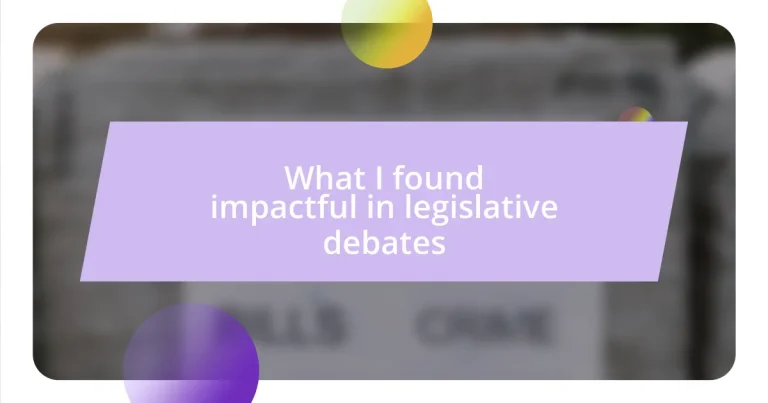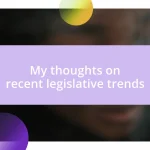Key takeaways:
- Legislative debates significantly influence public opinion and policy, shaping societal narratives around issues like education, healthcare, and climate change.
- Key themes such as social justice, economic equity, and environmental sustainability emerge during debates, often driven by personal stories that resonate emotionally with lawmakers and the public.
- Effective communication strategies, including storytelling and the use of visual aids, enhance understanding and engagement during debates, fostering connections between policymakers and constituents.
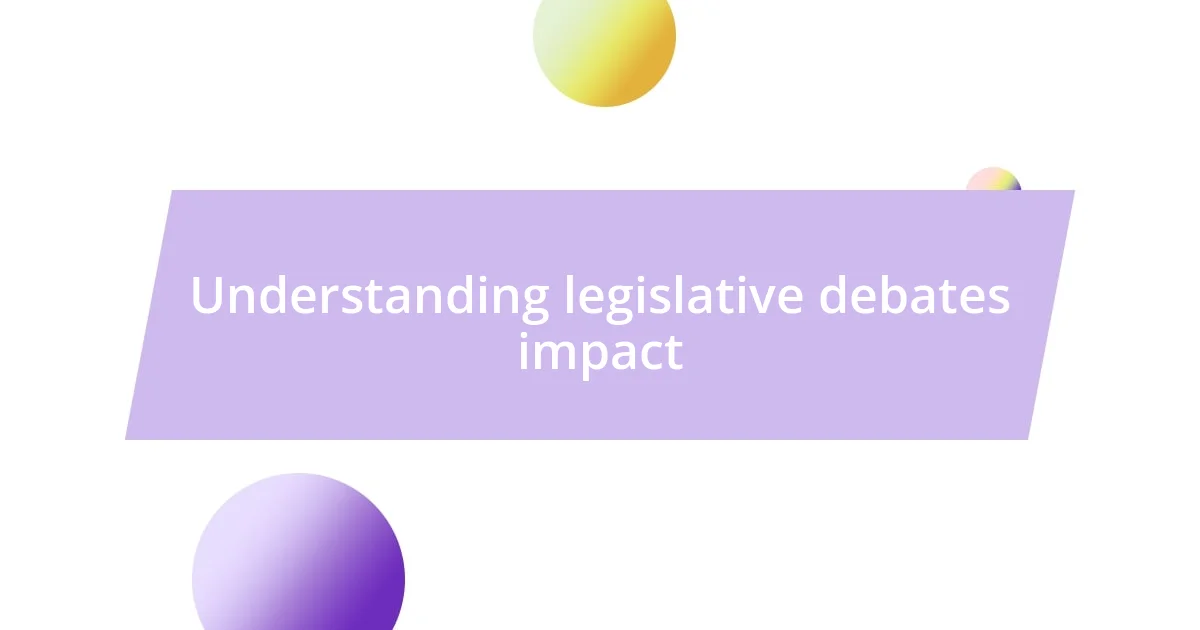
Understanding legislative debates impact
Legislative debates serve as a critical platform for diverse voices to be heard, shaping policies that directly impact our lives. I remember attending a town hall meeting where a heated discussion on education funding unfolded. The passion in the room was palpable, and it really struck me how each argument could sway public opinion and, ultimately, the decision-makers themselves.
What’s fascinating is how these debates influence not just laws but also the societal narrative around an issue. For instance, watching politicians grapple with healthcare reform, I felt a mix of hope and frustration. It made me wonder: how often do we underestimate the power of a single debate to ignite change in public consciousness? This realization underscores the weight that legislative discussions carry beyond the chamber, affecting people’s daily lives and perceptions.
Moreover, the emotional intensity of these debates often reveals underlying values and priorities within our society. I recall feeling quite moved during a discussion on climate change; the urgency in legislators’ voices echoed the concerns of many citizens. It left me questioning, how can we foster a connection between policymakers and the public that ensures these profound concerns are genuinely addressed?
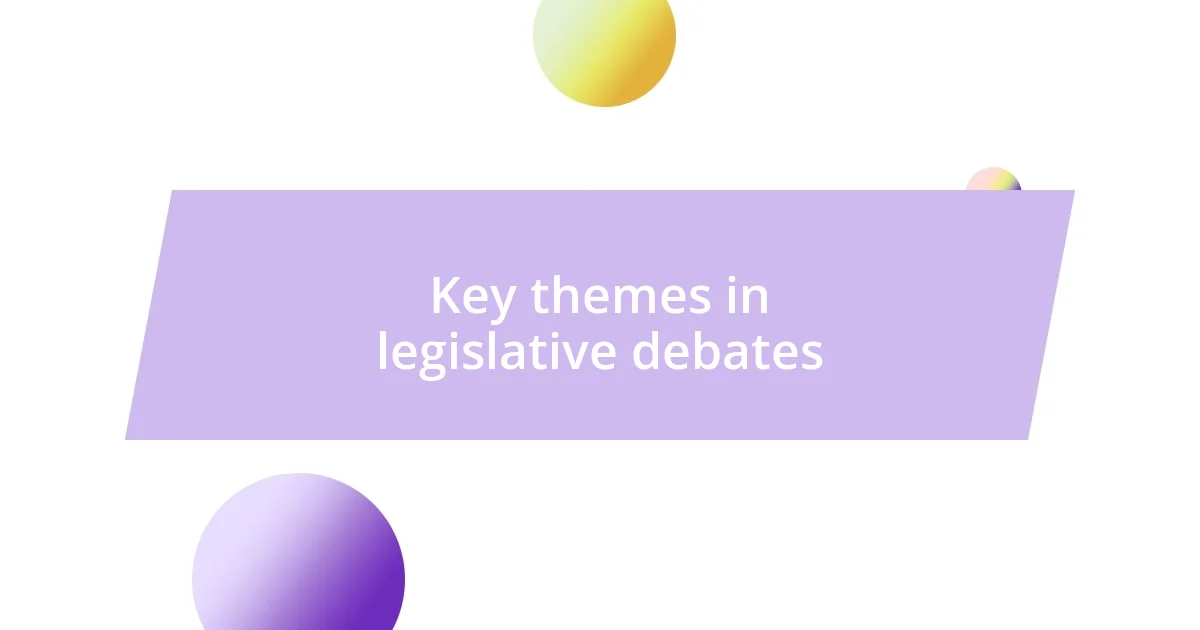
Key themes in legislative debates
Key themes in legislative debates often revolve around core societal values such as justice, equity, and sustainability. While observing a debate on gun control, I was particularly struck by how deeply personal stories from constituents can shift the tone of a discussion. Hearing a mother share her devastating experience after a tragic incident made it clear: these debates aren’t just about policies; they represent the very real struggles and fears of individuals. The emotional weight of such narratives elevates the debate, reminding us of the human lives at stake.
Some prevalent themes I’ve noted include:
- Social Justice: Advocating for marginalized voices often takes center stage, shaping the agenda of legislative discussions.
- Economic Equity: Debates frequently highlight the disparities in wealth distribution and the proposed solutions to bridge these gaps.
- Environmental Sustainability: The increasingly urgent call for climate action reveals a growing consensus on long-term sustainability as a priority for legislation.
- Healthcare Access: Conversations around healthcare reform are consistently charged, reflecting deep-seated beliefs about individual rights and public health responsibility.
These themes are not just academic; they resonate on a personal level, stirring up emotions and compelling lawmakers to respond to the pressing concerns of their constituents.
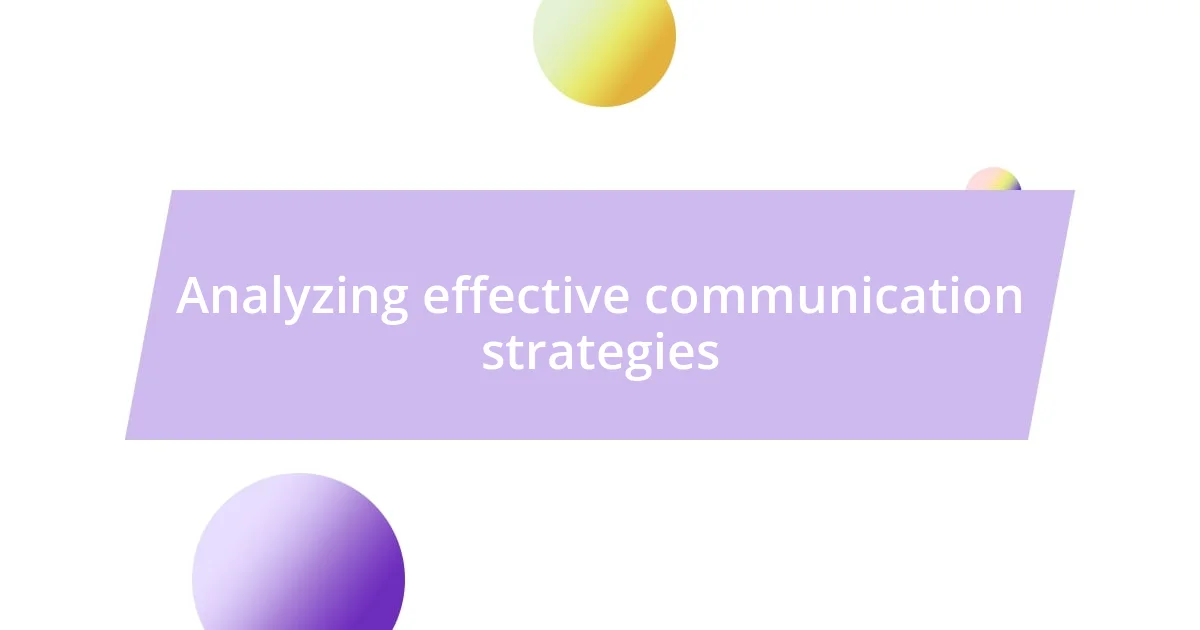
Analyzing effective communication strategies
Effective communication strategies in legislative debates often hinge on clarity and relatability. I recall a moment during a discussion on immigration reform when a senator shared a heartfelt story about their family’s journey. It was a simple narrative, yet it transformed the floor’s atmosphere. I could sense the shift; what was once a technical debate became a conversation about real lives and hopes. This kind of storytelling not only engages the audience but also humanizes complex topics, making them more accessible and relatable.
Moreover, the use of visuals during debates can significantly enhance understanding. I’ve noticed how presenting statistics via infographics can simplify intricate data points, making the information more digestible for both lawmakers and the public. During one debate, a graph displaying unemployment rates over time resonated deeply with the audience, making the urgency of job creation tangible. Visual aids, when executed well, can bridge knowledge gaps and foster informed discussions.
The role of body language and tone cannot be overlooked either. I remember watching a passionate advocate passionately emphasize certain phrases, which underscored their commitment to the issue at hand. The energy they brought changed the tenor of the debate, evoking emotional responses from those in attendance. It struck me how non-verbal cues can amplify a speaker’s message, encouraging empathy and engagement from the audience.
| Communication Strategy | Impact |
|---|---|
| Storytelling | Humanizes topics and fosters connection with the audience. |
| Visual Aids | Simplifies complex data and enhances understanding. |
| Body Language and Tone | Amplifies messages and evokes emotional responses. |

Notable examples of impactful debates
One debate that stands out to me is the discussion on climate change legislation. I remember tuning in when a young activist passionately addressed lawmakers, emphasizing the impact of their decisions on future generations. Her plea wasn’t just about statistics; it was about the world we’re leaving behind. I found myself reflecting on how our actions today shape the lives of those who come after us. That moment reminded me how impactful a single voice can be in swaying legislative priorities.
Another remarkable debate unfolded over healthcare reform, where a nurse shared her firsthand experience treating uninsured patients. She spoke about the sleepless nights weighing the burden of their needs against the systemic barriers they faced. I couldn’t help but feel the urgency in her words; it was a call for empathy in policy-making. Such personal narratives have the power to break through the often sterile language of legislation, urging lawmakers to prioritize human needs over bureaucratic processes.
In discussing immigration policy, a legislator shared an emotional story about their grandparents, immigrants who faced insurmountable challenges for a better life. Hearing this made me ponder: how often do we forget the human side of these complex issues? This debate wasn’t just about legal jargon; it became a touching reminder of the shared experiences that unite us. Moments like these are crucial because they highlight how deeply personal stories can, and often should, reshape our understanding of legislative issues.
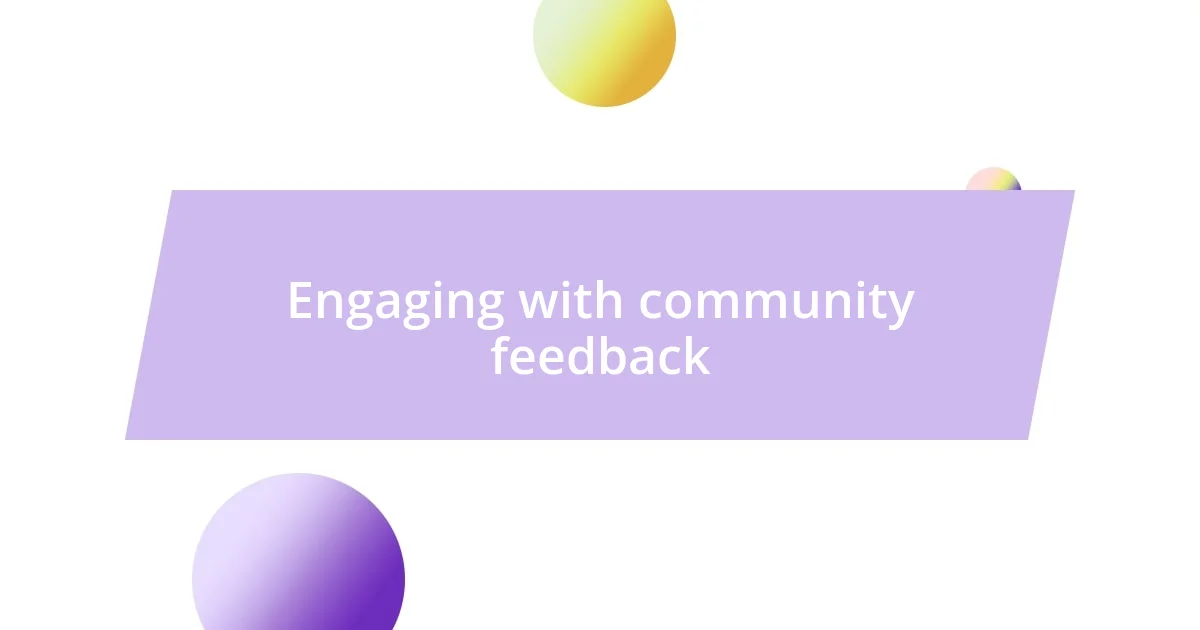
Engaging with community feedback
Engaging with community feedback is a powerful aspect of legislative debates. I remember attending a town hall meeting where constituents were encouraged to share their thoughts on a proposed housing bill. The moment a single mother stood up, visibly emotional, sharing her struggle to find affordable housing, I saw many heads nodding in agreement. It struck me hard: feedback isn’t just information; it’s a lifeline for lawmakers to connect with real issues that affect their voters.
I’ve often noticed how elected officials who actively seek community input tend to foster a sense of trust. During a recent public forum, a representative took time to address each question thoughtfully, acknowledging the fears and hopes of the attendees. It was refreshing to see a leader genuinely interested in the community’s voice. This level of engagement creates a dialogue rather than a monologue, shifting the power dynamics and encouraging more active participation from citizens.
Ultimately, community feedback shapes policies in profound ways. Consider a debate on environmental regulations where local fishermen voiced concerns about overfishing. Their firsthand accounts revealed the pressing nature of the issue, prompting legislators to reconsider their approach. I’ve learned that when lawmakers listen to their constituents, they not only gather insights; they also build a community that feels empowered to contribute to decision-making. Isn’t that what democracy should truly embody?
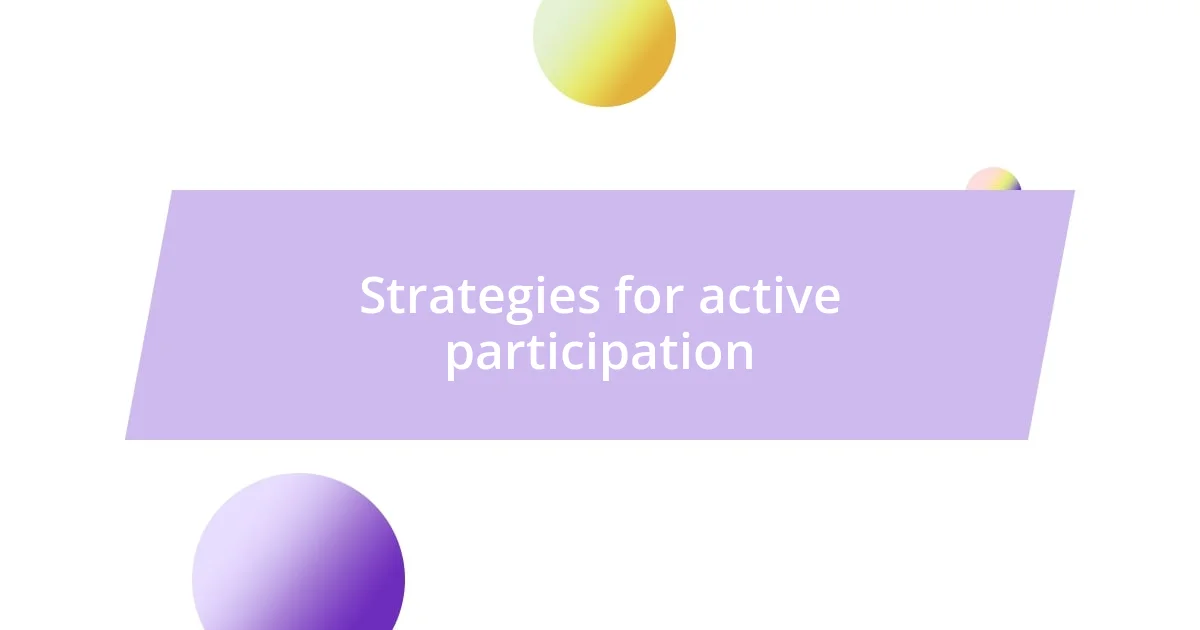
Strategies for active participation
Participating actively in legislative debates requires a strategic approach. From my experience, one effective strategy is to prepare thoroughly. Before attending a debate, I often research the topics and the key players involved. This not only boosts my confidence but also allows me to ask insightful questions. Have you ever noticed how a well-timed question can shift the entire conversation? It empowers anyone to clarify misconceptions or dive deeper into an issue, making the dialogue more engaging for everyone involved.
Another approach that I’ve found beneficial is the power of storytelling. Sharing personal experiences related to the topic at hand can truly resonate with others. For instance, during one debate on education reform, I shared how my own learning challenges shaped my perspective on inclusive education. The collective silence in the room spoke volumes as others connected with my narrative. Isn’t it fascinating how stories can create bridges between diverse viewpoints, encouraging a more profound understanding of the issues?
Finally, building coalitions is a strategy I believe cannot be overlooked. When I collaborated with local advocacy groups to discuss mental health policies, we amplified our voices and drew more attention to the pressing need for change. I’ve witnessed firsthand how collective action not only garners respect from lawmakers but also inspires others in the community to take part. Have you ever thought about the impact of joining forces with others? It’s remarkable how collaboration can transform legislative debates into powerful platforms for change.
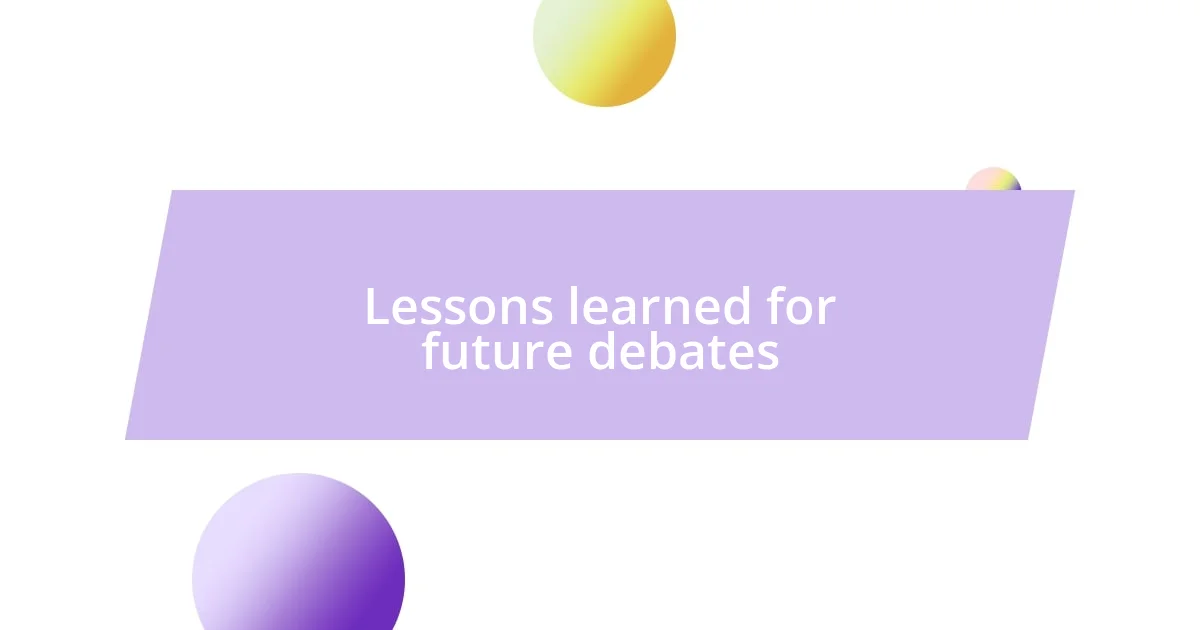
Lessons learned for future debates
Think about how vital clarity is in legislative debates. I recall a particularly heated discussion on healthcare where the jargon used by speakers often left the audience confused. Afterward, I found it incredibly impactful when a speaker broke down complex terms into simple language. It lit up the room; people felt they could finally grasp the essence of the discussion. This experience taught me that clarity promotes participation, making complex issues accessible to everyone.
Another lesson I’ve internalized is the importance of emotional intelligence. During one debate, a passionate advocate spoke about the struggles families face in accessing necessary resources. It wasn’t just the facts they presented; it was how they conveyed the emotional weight behind those facts. I realized then that debates should carry an emotional resonance, creating a human connection that numbers alone can’t provide. Isn’t it interesting how emotions can foster empathy in discussions that are often dispassionate?
Lastly, I’ve seen how preparing for counterarguments fosters a richer dialogue. In one debate on public transportation, I prepared not just to present my viewpoint, but also to anticipate opposing views. This preparation allowed me to engage in a more respectful and constructive exchange. It was a refreshing experience, as it encouraged a collaborative atmosphere instead of a combative one. Have you ever considered how listening to different perspectives could enhance your understanding? It’s truly enlightening, and it lays the groundwork for more meaningful discussions in future debates.












